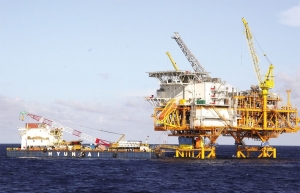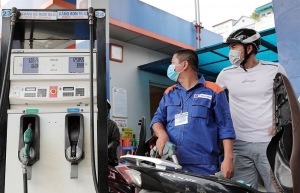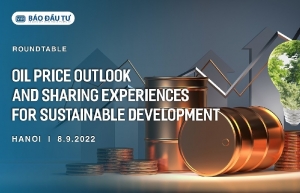Insights into oil price volatility and strategies to cope with fluctuations
The roundtable titled Oil Price Outlook and Sharing Experiences for Sustainable Development was hosted by VIR on September 8 in Hanoi, with the presence of 80 participants from departments, sectors, businesses, and the press.
 |
According to Le Tuan Anh, director general of the Department of Industrial Economy, following the Russian-Ukraine conflicts, oil prices have been steadily increasing since the end of last year, rising from $75 per barrel at the end of December 2021 to above $100.
Oil prices set a new record high on March 8 at almost $140 per barrel because the US sanctions on Russia targeted certain imports, including fuel and raw materials. From April to the beginning of September, the price varied between $100 and $126 per barrel.
“Oil prices are expected to stay high in the near future due to a variety of potentially complex and unpredictable factors. Based on an evaluation of supply-demand trends and global development prospects, some international organisations predict that oil prices will swing between $100 to $115 per barrel this year, or roughly 40 per cent to 60 per cent more than in 2021. Oil prices are expected to reduce to $92 per barrel in 2023 and $80 per barrel in 2024,” he added.
He also cited the analysis of the Bank of America and Morgan Stanley showing that oil prices could reach $150 per barrel if Russia's oil exports drop sharply.
At the seminar, Luong Van Khoi, vice president of the National Centre for Socioeconomic Information and Forecast under the Ministry of Planning and Investment, pointed out many factors for the potential decline in oil prices. First, the oil supply is improved since the US is placing pressure on Saudi Arabia and the United Arab Emirates, two of the top OPEC producers, to increase oil production, which helps contain the rise in oil prices.
The second factor is the bleak global economic outlook, which lowers oil demand and drives down global oil prices. Raising interest rates by major central banks like those in the US and the EU will have a negative impact on global economic development and may result in a decline in oil prices.
"The aforementioned factors indicate that oil prices will probably continue to decline through the end of the year. If the EU's proposal to revive the Iran nuclear deal is accepted, Iran's oil exports will rise by at least a million barrels per day. This could result in further drops in oil prices,” Khoi noted.
However, Khoi also delved into the possibility of rising oil prices in the last quarter of this year. Specifically, the increase happens in winter due to the growing demand for heating fuel, especially in Europe.
China is gradually easing pandemic control measures and may reopen cities to promote economic growth and trade, thereby increasing oil demand. The Russia-Ukraine tensions, coupled with Western sanctions against Russia are also some major reasons for the sharp increase in oil prices.
At the seminar, economic experts from organisations and associations as well as several local and foreign business representatives offered many practical solutions and useful suggestions in order to overcome the immediate difficulties and stabilise production and business activities in the direction of sustainable development.
 |
Phan Duc Hieu, standing member of the Economic Committee of the National Assembly, discussed the impact of fuel prices on the business operations of the general economy and the business sector, as well as initiatives for governmental policies to encourage and assist economic activity.
Hieu shared, “Petroleum is regarded as an international business with a number of risk factors. Thus, it should take international practices into account. The amended Law on Petroleum only covers the exploration and production of upstream oil and gas. Meanwhile, midstream and downstream oil and gas activities like petrochemical refining, fertiliser production, and electricity generation are governed by other laws.”
According to Hieu, the market context and conditions in Vietnam show that it is necessary to synchronise the Law on Petroleum with other laws. For example, the construction of a gas pipeline is governed by a number of other laws. Therefore, the provisions in the draft amended law should facilitate the implementation of oil and gas exploration and exploitation projects in series. This would help avoid legal conflicts as well as the cumbersome application process of submitting documents to many agencies and ministries.
| According to Le Quang Trung, vice president of the Vietnam Logistics Business Association, the government must support businesses in stabilising domestic fuel prices. He also suggested the National Assembly and the government reduce special consumption and environmental protection taxes, which account for a large proportion of the structure of fuel prices. |
“The government should continue relief measures to reduce tax and stabilise the petroleum market at least through the end of the first half of 2023 to support businesses and logistics firms to restore production and business activities. Given that transportation costs make up 60 per cent of logistics costs, greater efforts should be made to cut these costs,” he added.
Meanwhile, Kenya Maeda, senior executive officer for Integrated Supply & Trading Crude & Global Business at Idemitsu Kosan Co.,Ltd, emphasised the importance of supply chains and their characteristics in the petroleum sector, including the global price trend of fuel products, especially in Asia.
He also shared the best practice from Japan. Accordingly, Japan used to depend on imports of petroleum products. However, since the 1950s, the country has introduced policies about the transition to refining methods.
“By the 1970s, oil refineries had been built in many localities across Japan. Domestic oil refineries boast an economic advantage over imports, contributing to limiting foreign currency outflows overseas. It is necessary to combine domestic oil refining and product imports to ensure the energy security of petroleum products,” he added.
As a mediator between both the buyer and the seller, Nguyen Duc Dung, deputy general director of the Mercantile Exchange of Vietnam, provided an insight into business operations that converse with fluctuations in the cost of gasoline and advised businesses on how to stabilise production in light of volatile oil prices.
According to Dung, around the world, petroleum companies frequently use price hedging tools such as futures and options contracts to fix import and export prices over a period of months or even years. As a result, input and output prices remain steady. They have more room to control the market amidst price swings.
“I hope we will soon synchronise the policies of the ministries and agencies. Thus, petroleum and oil businesses are more confident in using price hedging tools effectively. Businesses under the Vietnam Petroleum Association have great interest in these price hedging tools. However, there are still many obstacles in terms of policies to effectively implement these tools,” he stressed.
 | Oil and gas sector counting on vital new investment cycle As oil prices anchor around $90-100 per barrel globally, changes in the oil and gas policy of many markets are expected to bring a new cycle of investment to Vietnam – with the government also taking steps to transition to renewable energy sources by cooperating with countries around the world. |
 | Vietnamese oil facing significant hurdles The government is promoting energy self-reliance rapidly as global developments have significantly changed the world’s energy situation, pushing Europe into gas scarcity for this winter. |
 | Roundtable: Oil Price Outlook and Sharing Experiences for Sustainable Development On September 8, Vietnam Investment Review (VIR) will host a roundtable titled "Oil Price Outlook and Sharing Experiences for Sustainable Development" to discuss the impact of oil price fluctuations on Vietnam's economy and the various measures to maintain stable and sustainable growth. |
What the stars mean:
★ Poor ★ ★ Promising ★★★ Good ★★★★ Very good ★★★★★ Exceptional
Related Contents
Latest News
More News
- Opening remarks of 14th National Party Congress (January 20, 2026 | 09:44)
- First working day of 14th National Congress of Communist Party of Vietnam (January 19, 2026 | 08:54)
- Viettel starts construction of semiconductor chip production plant (January 16, 2026 | 21:30)
- Redefining Vietnam’s growth model for the era of innovation (January 16, 2026 | 16:40)
- Foreign sentiment towards Vietnam turns more positive (January 15, 2026 | 11:08)
- Vietnam ranks 38th in global AI adoption (January 14, 2026 | 16:01)
- European business confidence reaches highest in seven years (January 13, 2026 | 10:17)
- UOB lifts Vietnam growth outlook to 7.5 per cent for 2026 (January 10, 2026 | 09:00)
- Vietnam leads ASEAN in EV market growth (January 09, 2026 | 14:39)
- Electronics drive Vietnam’s trade growth as exports hit record in 2025 (January 07, 2026 | 10:23)

 Tag:
Tag:





















 Mobile Version
Mobile Version